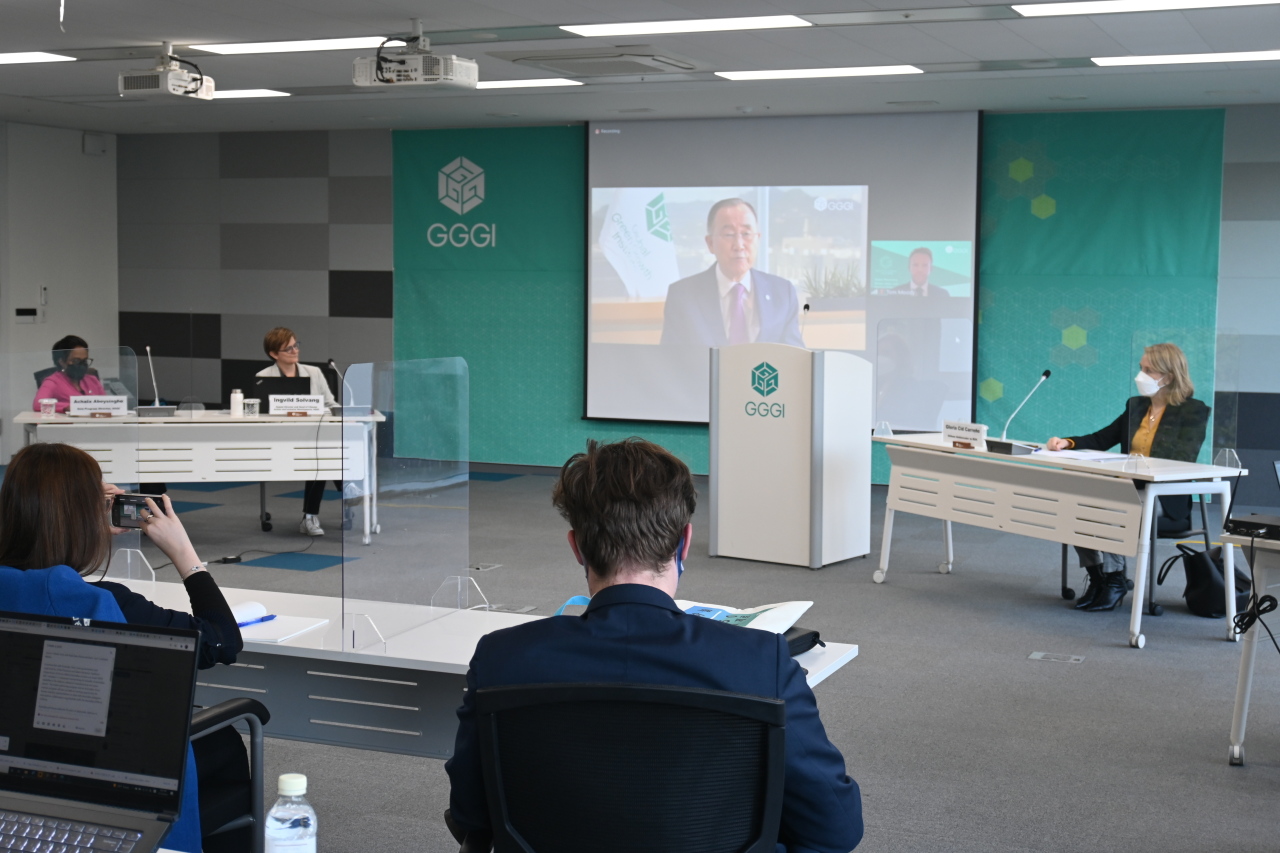 |
Former UN Secretary-General Ban Ki-moon delivers opening remarks through a video message at GGGI headquarters on Oct. 27 (Sanjay Kumar/The Korea Herald) |
Global Green Growth week 2021 discusses success standards for developed and developing countries
The Global Green Growth Institute and the British Embassy in Seoul co-organized a hybrid session to discuss standards for developed and developing countries, at GGGI headquarters on Oct. 27
Experts and decision-makers from developing and developed nations attended the session, part of GGGI week 2021, titled “Road to COP 26: what does success look like for developed and developing countries?”
The purpose of the session was to address expectations for COP26 and understand how international organizations like GGGI have provided services for GGGI members and partners who directly and indirectly supported the nationally determined contributions revision process.
Former UN Secretary-General Ban Ki-moon opened the session saying, “GGGI week 2021 is a platform for experts and practitioners from all Asian and Pacific regions to discuss and share about their experiences, with innovative ideas and solutions, renewable energy and energy efficiency, a finance mechanism to mobilize green investment, carbon pricing, flood resilient buildings, the blue economy, sustainable landscape, circular economy and more.”
The GGGI said in a statement that the world was moving in the right direction but catastrophe continues to loom.
“Of the total of 75 parties to the Paris Agreement that met the 2020 deadline for revised NDC submission, 20 were among GGGI’s 39 Members. Additionally, five GGGI partners submitted revised NDCs in 2020, and more have committed to submit in 2021. There are positive trends in that climate change has like never before entered the agenda in many developed countries. Nevertheless, the UNFCCC Synthesis reports show that with the combined levels of ambition, the world is on catastrophic path to a 2.7 degree warming,” the press statement specified.
The statement said that as developing world is the least responsible for climate change but most vulnerable to the impacts, the COP26 should be inclusive to ensure strong voices of least developed countries in decision making and in benefitting from the shift toward low emission development pathways.
British ambassador to Korea Simon Smith recalled the Paris agreement adopted in 2015 to avoid dangerous climate change.
“Six years ago in Paris, the world leaders provided with consensus, ambition and hope that they would strive to limit the temperatures below 2 degrees Celsius and make efforts to capping the rise in temperature at 1.5 degree Celsius,” Smith said.
“At COP 26, the world needs to fulfil the needs of Paris agreement,” he said, adding that developed countries must significantly scale up finance and make it accessible and usable.
Chilean Ambassador to South Korea Gloria Cid Carreno touted 2021 as a year of multilateral diplomacy seeking out global agreements and crucial issues that would be the road map for the next 15 years.
“The commitments and obligations are universal, accepted by all countries regardless of the level of development. They are inclusive, they are transformative, action oriented, people centered and measurable over time,” she said.
“We have set concrete and ambitious goal by 2030 including a cap on the initial for the period 2020-2030 reducing greenhouse gas emissions by 16 percent compared to 2016.”
She highlighted that Chile will arrive at COP26, as the first country in South America to comply with the Paris Agreement and present a long-term climate strategy in addition to its proven legal framework on climate change.
By Sanjay Kumar (
sanjaykumar@heraldcorp.com)








